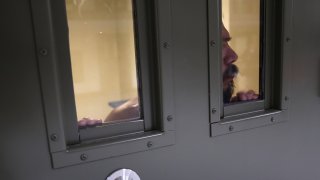
ADELANTO, CA – NOVEMBER 15: An immigrant detainee looks from his ‘segregation cell’ at the Adelanto Detention Facility on November 15, 2013 in Adelanto, California. Most detainees in segregation cells are sent there for fighting with other immigrants, according to guards. The facility, the largest and newest Immigration and Customs Enforcement (ICE), detention center in California, houses an average of 1,100 immigrants in custody pending a decision in their immigration cases or awaiting deportation. The average stay for a detainee is 29 days. The facility is managed by the private GEO Group. ICE detains an average of 33,000 undocumented immigrants in more than 400 facilities nationwide. (Photo by John Moore/Getty Images)
A human rights organization with a Los Angeles office sent a letter to the state Supreme Court Friday, urging judges to stop the transfer of deportable non-citizens from jails and prisons to federal immigration detention centers during the coronavirus pandemic.
In the friend of the court letter, Human Rights Watch submitted what it claims is evidence from its investigation into substandard care in immigration detention facilities, allegedly illustrating why transfers of immigrants into the federal system during the pandemic are dangerous.
Alexx Pons, a spokesperson for U.S. Immigration and Customs Enforcement, said that while the health, safety and welfare of detainees is a priority, a transfer into an ICE facility may be deemed necessary.
A transfer can occur for a variety of reasons, including security issues, to comply with a court order or to place the detainee in a more appropriate facility based on circumstances and risk factors, Pons said.
"All detainee transfers and transfer determinations are based on a thorough and systematic review of the most current information available," Pons said, adding that ICE facilities "take every precaution" to ensure the health, safety and wellbeing of those in custody.
The American Civil Liberties Union filed the petition for a court order to halt the transfers on April 24, on behalf of the Southern California chapter of the California Attorneys for Criminal Justice and American Immigration Lawyers Association.
The so-called friend of the court letter was penned by Grace Meng, senior U.S. immigration researcher at Human Rights Watch.
Local
Get Los Angeles's latest local news on crime, entertainment, weather, schools, COVID, cost of living and more. Here's your go-to source for today's LA news.
"Now is not the time for California to increase the numbers of people
locked up in immigration detention," Meng wrote. "By stopping transfers into these facilities, the state can take action now to protect detainees, detention facility staff and the wider community from further illness and death due to COVID-19."
California transfers many non-citizens who are released from prisons and jails -- because they have completed sentences, earned parole or been granted bail -- into the federal immigration detention system. As a result, local prisons and jails significantly contribute to the immigration detention population, according to Human Rights Watch.
The amicus letter also describes the situation at the Otay Mesa Detention Center in San Diego County, where more than 100 detainees in the custody of ICE or U.S. Marshals, and 33 employees, are reported to have tested positive for COVID-19 as of April 26.
On Thursday, a federal judge in San Diego directed the federal government to release more than 50 medically vulnerable detainees from the facility.
Meng's letter also cited a recent study released online by the Journal of Urban Health, which modeled the rate of COVID-19 transmission within 111 ICE detention facilities. The model showed that 72% of people detained in the facilities would be infected with the coronavirus 90 days after a facility had five infected cases. The model further showed that high rates of infection could contribute to overloading regional hospitals in the detention center's community.
"ICE's record shows that it is wholly unprepared to address a public
health crisis of this magnitude or to address the health needs of any people added to the detention system," Meng said. "If immigrants and workers in immigration detention in California get sick at high rates, hospitals in California's communities are also likely to become overloaded."